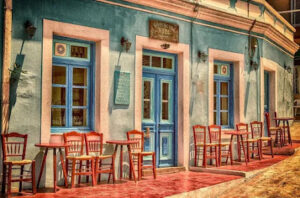What are some Spanish phrases for travel?
In this lesson you will learn some popular Spanish phrases for travel. Now, let’s get around.
-¿Dónde está la parada de autobuses? (Where is the bus stop?)
-La parada está en la esquina. (The bus stop is at the corner.)
-¿Dónde está la entrada? (Where is the entrance?)
-La entrada está a la derecha. (The entrance is to the right.)
-¿Dónde está la salida? (Where is the exit?)
-La salida está a la izquierda. (The exit is to the left.)
-¿Dónde está el restaurante? (Where is the restaurant?)
-El restaurante está en frente del hotel. (The restaurant is in front of the hotel.)
-¿Dónde está mi habitación? (Where is my room?)
-Su habitación está arriba , en el segundo piso. (Your room is upstairs, in the second floor.)
-¿Dónde está la cafétería? (Where is the caféteria?)
-La cafétería está abajo, en el sótano. (The caféteria is downstairs, in the basement.)
en la esquina (at the corner)
a la derecha (to the right)
a la izquierda (to the left)
en frente de (in front of)
arriba (up stairs / above / up)
abajo (down stairs / below / down)
Shop
-¿Cuánto cuesta el pasaje / el boleto? (How much is the fare / ticket?)
-El boleto cuesta diez dólares. (The ticket cost ten dollars.)
-Quisiera un boleto por favor. (I’d like a ticket please.)
-Aquí tiene. (Here it is. -or- Here you have it.)
-Muchas Gracias. (Thank you very much.)
Note: Pasaje only refers to a bus ticket, plane ticket, or train ticket. Boleto could be a bus, plane or train ticket and could be a ticket for a movie, a play, a game, etc.
In The Restaurant
sin (without)
con (with)
-Quisiera un emparedado de queso y pavo sin lechuga. (I’d like a cheese and turkey sandwich without lettuce.)
-¿Desea tomar algo / beber algo? (Do you wish to drink something?)
-Sí, me gustaría una coca cola con hielo (Yes, I’d like a coke with ice.)
-Aquí tiene. ¿Desea algo más? (Here it is. Do you want something else?)
-No, todo está bien. Gracias. (No, everything is fine. Thanks.)
Physical and Mental States
Yo tengo hambre (I am hungry)
Tengo sed (I am thirsty)
Tengo frío (I am cold)
Yo tengo sueño (I am sleepy)
Tengo calor (I am hot)
Tengo miedo (I am afraid)
Yo estoy cansado (masculine)/cansada (fem) (I’m tired)
Estoy contento / contenta (I am happy)
Estoy enojado / enojada (I am angry)
Yo estoy enfermo / enferma (I am ill)
Estoy aburrido / aburrida (I am bored)
Estoy perdido / perdida (I am lost)
Note: In Spanish we describe some mental and physical states with tener and others with estar. The rule is that when we are going to express a mental or physical state with tener we have to use:
tener + noun ; and when we are going to describe a mental or physical state with estar we have to use: estar + adjective. The above are the most commonly used, so if you remember those you’ll be fine.
Read more about traveling vocabulary

Leave a Reply
You must be logged in to post a comment.